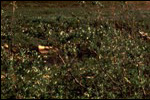
| Home
Mission 2007 Team Information Research Topics Sources Progress Journal |
|
JURISDICTION
- FEDERAL/STATE Summary: This research discusses state/federal relations regarding establishment of protected lands and the further maintenance/protection of the land and the species that live therein. Lands in Alaska can't be designated protected under this title, they must be so designated by separate approval of the Congress. In general federal law governs lands and federal organizations maintain the land. In some cases state organizations are responsible though, especially when there is no federal group doing so. The governments should work together for the preservation of fish and wildlife. International agreements regarding fish and wildlife protection are within the power of the president. Purpose: ANWR is federal land and it is important to understand the power the state of Alaska has in matters concerning ANWR. Relevance: Though none of the specific regulations apply to Alaska these Sections set important state/federal guidelines. Since ANWR is federal land Alaska can't make a decision, as a state government, regarding opening ANWR for drilling. The international jurisdiction brings another key argument into play. Many of the species that live in ANWR for parts of the year also live in other countries. Does the US government have the right to disturb the habitat of animals and birds that may be protected under another nation's laws or even under international law? Title 43: Public Lands: Interior Chapter 35: Land Policy Section 1784-Lands in Alaska -"Notwithstanding any other provision of law, section 1782 of this title shall not apply to any lands in AK." -Sec. can issue a report for areas he "determines are suitable" and Congress can "inclusion of any such areas in the National Wilderness Preservation System" Section 1782 -roadless land study, Sec. of Interior shall report to President; these lands will be defined here after as wilderness if approved. Report by July 1, 1980 Chapter 2: Bureau of Land Management, Department of the Interior Section 6301.1 - Purpose -"This part governs the management of BLM Wilderness Areas outside of Alaska." Chapter 24: Department of the Interior Fish & Wildlife Policy: State-Federal Relationships Section 24.1 (a)-"In 1970,. . .intergovernmental cooperation in the preservation, use and management of fish and wildlife resources. . .(36 FR 21034, Nov. 3, 1971) -Confusion sometimes exists between governments about who has the authority over land and what exists upon it. -"Federal authority exists for specified purposes while State authority regarding fish and resident wildlife remains the comprehensive backdrop applicable in the absence of specific, overriding Federal law." (b)-Fish and wildlife are important, according to the government, to the quality of life of all citizens. -"The Secretary of the Interior reaffirms that fish and wildlife must be maintained for their ecological, cultural, educational, historical, aesthetic, scientific, recreational, economic, and social value to the people of the United States. . ." (c)-This section establishes that the Department of the Interior Fish & Wildlife Policy will be used to maximize the cooperation of state and governments in the common goal of preserving fish and wildlife for future generations. Section 24.3 (b)-"Congress has, in fact, reaffirmed the basic responsibility and authority of the States to manage fish and resident wildlife on Federal lands." -The Secretary of Interior assumes jurisdiction of the lands as head of the Department of the Interior. Section 24.4 (e)-The National Wildlife Refuge System Administration Act of 1966 (16 USC 668dd) defines federal and state authorities in wildlife refuges. In general the federal government has jurisdiction, but tries to comply with all state laws possible to maximize flexibility and coordination. (g)-"In areas of exclusive Federal jurisdiction, State laws are not applicable. However, every attempt shall be made to consult with the appropriate states to minimize conflicting and confusing regulations which may cause undue hardship." Section 24.5 (a)-"International conventions have increasingly been utilized to address fish and wildlife issues having dimensions beyond national boundaries. The authority to enter into such agreements is reserved to the President by and with the advice and consent of the Senate." -Any negotiations with Canada about a natural gas pipeline will have to go through the executive branch instead of the legislative branch. It seems as though Canada would have the same intents and purposes as the U.S., but the second part of (a) provides a loophole. -"However, while such agreements may be valuable in the case of other nations, in a Federal system such as ours sophisticated fish and wildlife programs already established at the State level may be weakened or not enhanced." Source: U.S. Code Annotated. United States of America, 2000. |



| Last updated: 9 Nov.
03 23:15 Page Layout: Mariela Perignon |
Kat Vater - kvater@mit.edu Team 9 - m2007-9@mit.edu |